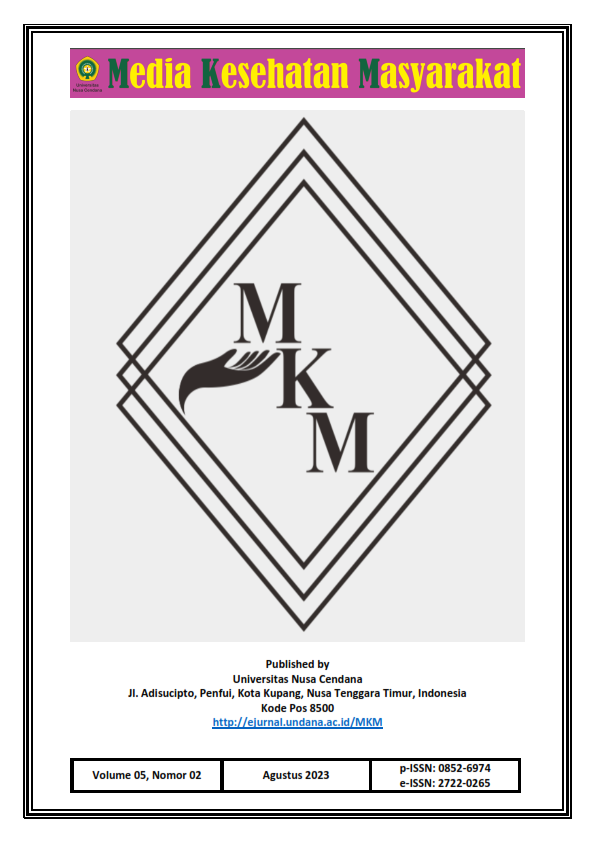The Relationship Between Body Mass Index and Family Support for COVID-19 Recovery in Self-Isolating Patients
Abstract
From July 2021 to March 2022, cases of COVID-19 were reported increasing every day. The SARS-CoV2 virus infects the human body via the ACE2 receptor, the expression level of ACE2 is highest in adipose tissue. This causes obese patients to show more severe symptoms of COVID-19. During the independent isolation period, patients really need help from other parties in order to be able to meet their needs, especially in terms of providing consumption and medicine as well as motivation to obtain recovery, especially from the closest people, namely the family. The general aim of this study is to describe the correlation between body mass index and family support for COVID-19 recovery in self-isolation patients. This research is an analytic observational study with a cross-sectional design and a sampling technique using simple random sampling. The research instrument used medical records and family support questionnaires. The data obtained were analyzed using bivariate analysis, namely the chi-square test. The results of the study explained that there was a significant relationship between body mass index and family support for COVID-19 recovery in self-isolated patients in the work area of the Brebes Health Center. COVID-19 patients who have an obese body mass index are advised to seek treatment at the hospital if they already have symptoms of COVID-19 in the moderate category. Families are advised to increase family support, especially when caring for COVID-19 patients who are carrying out independent isolation. It is hoped that the government can become an evaluation and input to better monitor the health of patients who are conducting independent isolation, especially patients who have an obese body mass index.
Downloads
References
Nyamnjoh FB. Covid19: In: Covid Stories from East Africa and Beyond. 2020.
Gugus Tugas Percepatan Penanganan COVID-19. Peta Sebaran Kasus COVID-19 di Indonesia. covid19.go.id. 2021.
Hussain A, Mahawar K, Xia Z, Yang W, EL-Hasani S. Obesity and mortality of COVID-19. Meta-analysis. Obes Res Clin Pract [Internet]. 2020;14(4):295–300. Available from: https://doi.org/10.1016/j.orcp.2020.07.002
Satgas Penanganan Covid-19. Dahulukan Pasien COVID-19 Bergejala Berat dan Sedang untuk Dirawat di Rumah Sakit. Berita Terkini. 2021.
Soeroto AY, Soetedjo NN, Purwiga A, Santoso P, Kulsum ID, Suryadinata H, et al. Effect of increased BMI and obesity on the outcome of COVID-19 adult patients: A systematic review and meta-analysis. Vol. 14, Diabetes and Metabolic Syndrome: Clinical Research and Reviews. 2020.
Di Cesare M, Bentham J, Stevens GA, Zhou B, Danaei G, Lu Y, et al. Trends in adult body-mass index in 200 countries from 1975 to 2014: A pooled analysis of 1698 population-based measurement studies with 19.2 million participants. Lancet. 2016;
Darmalaksana W. Semangat Sembuh dari Paparan COVID dengan Basis Keluarga: Studi Lapangan Masa PPKM. Bandung: Fakultas Ushuluddin; 2021.
Pranata R, Lim MA, Yonas E, Vania R, Lukito AA, Siswanto BB, et al. Body Mass Index and Outcame in Patients with COVID-19; A dose-response mata-analysis. DIabetes Metab. 2020;47(2021):1–10.
Primeisa A. Indeks Keparahan Radiografi Dada pada Pasien Covid-19 Rawat Inap RSUP Dr . Mohammad Hoesin Palembang Tahun 2021. Universitas Sriwijaya; 2021.
Wiraharja RS. Peranan Ilmu Kesehatan Masyarakat dalam Penanggulangan COVID-19. Jakarta: Penerbit Universitas Katolik Indonesia; 2020.
Harahap U. Badai Sitokin, Dinamika Transmisi, Pendekatan dan Opsi Farmakoterapi Terinfeksi Sarcove-2 (COVID-19). Sumatera Utara: Universitas Sumatera Utara; 2020.
Sharma JR, Yadav UCS. COVID-19 Saverity in Obese Patients: Potential Mechanisms and Molecular Targets for Clinical Intervention. Obes Res Clin Pract. 2020;15(2021):163–71.
Cinti S, Graciotti L, Giordano A. COVID-19 and fat embolism : a hypothesis to explain the severe clinical outcome in people with obesity. Int J Obes. 2020;(44):1800–2.
Mohammadi M, Shayestehpour M, Mirzaei H. The impact of spike mutated variants of SARS-CoV2 [Alpha, Beta, Gamma, Delta, and Lambda] on the efficacy of subunit recombinant vaccines. Braz J Infect Dis. 2021;25(4).
Lotfi M, Hamblin MR, Rezaei N. COVID-19: Transmission, Prevention, and Potential Therapeutic Opportunities. Clin Chim Acta. 2020;508(January):254–66.
Mohandas S, Yadav PD, Shete A, Nyayanit D, Sapkal G, Lole K, et al. SARS-CoV-2 Delta Variant Pathogenesis and Host Response in Syrian Hamsters. Viruses. 2021;13(1773):1–10.
Qadir FI, Kakamad FH, Abdullah IY, Abdulla BA, Mohammed SH, Salih RQ, et al. The relationship between CT severity infections and oxygen saturation in patients infected with COVID-19, a cohort study. Ann Med Surg. 2022;76(January):1–4.
Irnawati NM, Siagian IET, Ottay RI. Pengaruh Dukungan Keluarga terhadap Kepatuhan Minum Obat pada Penderita Tuberkulosis di Puskesmas Motoboi Kecil, Kota Kotamobagu. J Kedokt Komunitas dan Top. 2016;IV(1):59–64.
Nasedum IRi, Simon M, Fitriani. Hubungan Dukungan Keluarga terhadap Kepatuhan Pengobatan Pasien Tuberkulosis Paru. Wind Heal J Kesehat. 2021;4(4):358–63.
Wardani DS, Arifin S. The Role of Family Support in the Recovery of Corona Virus Disease-19 Patients. Maced J Med Sci. 2021;9(E):1005–9.
Devaney C, Canavan J. What Works In Family Support. Ireland: National Guidance & Local Implementation; 2016. 1–89 p.
Copyright (c) 2023 Author

This work is licensed under a Creative Commons Attribution-ShareAlike 4.0 International License.

 Mutiara Nurul Imani(1*)
Mutiara Nurul Imani(1*)














